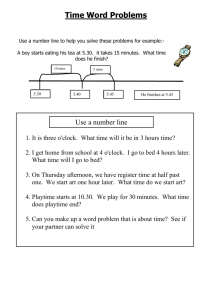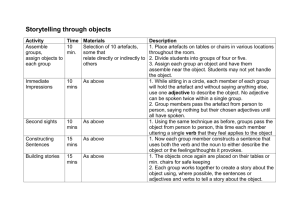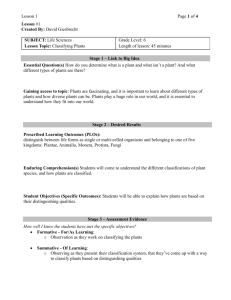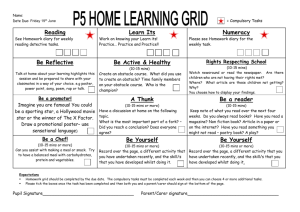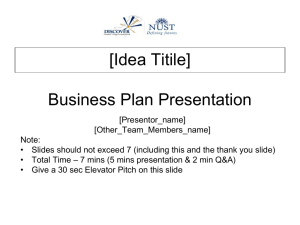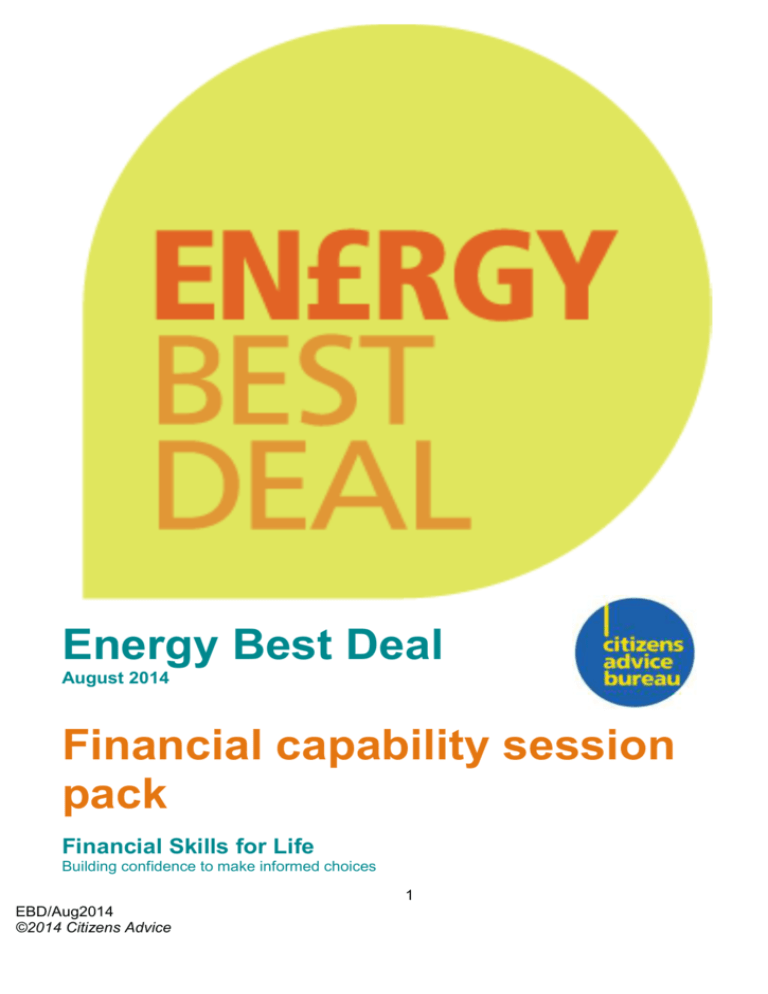
Energy Best Deal
August 2014
Financial capability session
pack
Financial Skills for Life
Building confidence to make informed choices
1
EBD/Aug2014
©2014 Citizens Advice
Energy Best Deal
Introduction
These notes and accompanying materials are for delivering a financial capability session
on ‘Energy Best Deal’ in small group settings and can be used with consumers (such as
tenants groups, parents groups, pensioners, home start groups etc) and also adapted for
use with frontline workers (such as Homestart volunteers, tenancy support workers,
children’s centre staff).
The timings in the session plan are the basis for a one hour session. However, typically
sessions can take up to 1 ½ to 2 hours to allow more time for questions and discussions
on the topics covered.
Subject information
Trainers do not need to be an expert on areas such as energy efficiency or debt.
Most of the information you will need is contained in the facilitator notes, including
where to signpost people for further help. If you get questions you can’t answer,
pass these to: Beth.Bell@citizensadvice.org.uk and if appropriate we will seek
guidance from Ofgem.
The key resources for running the session are:
Booklet
Facilitator Notes
PowerPoint presentation
This session plan
Handouts 1(a and b),2,3,4
Case study forms
Feedback questionnaires for frontline workers and consumers
Local information
You should also carry out some background research about what energy efficiency
schemes are available in your area. For example, if the Local Authority are providing
additional support for insulation or grants for home improvements. Also have details about
where people can go for help with benefits, grants and debt such as local Citizens Advice
Bureau opening times.
Other online information and leaflets
You may wish to order or download other leaflets such as the Age Concern ‘Winter
Wrapped up’ available from www.ageuk.org.uk.
If an internet connection is possible at the venue, take a laptop to the session, particularly
for any sessions for frontline workers. This will enable you to display different websites such as price comparison sites - in order to demonstrate switching information. If you don’t
have internet access, you need to print out some sample pages from a price
comparison website to show participants.
2
EBD/Aug2014
©2014 Citizens Advice
2
Some of the people who will attend the presentations may be able to use the internet but
may not have easy access to a computer. You could find some local information about
where people might be able to access the internet, such as libraries, local training
agencies or clubs for older people.
Useful websites:
Citizens Advice Advice Guide - www.adviceguide.org.uk
Energy UK - www.energy-uk.org.uk
Energy Made Clear - www.energymadeclear.co.uk
National Energy Action - www.nea.org.uk
Other useful websites are listed in the booklet and the facilitator notes
Copyright © 2014 Citizens Advice. All rights reserved. Any reproduction of part or all of the contents in any
form is prohibited except with the express written permission of Citizens Advice.
Citizens Advice is an operating name of the National Association
of Citizens Advice Bureaux, Charity
3
3
registration
number
279057.
VAT
number
726020276.
Company
Limited
by Guarantee. Registered number
EBD/Aug2014
1436945 England. Registered office: Citizens Advice, 3rd Floor North, 200 Aldersgate Street, London, EC1A
©2014
Citizens Advice
4HD
Contents
Page
Session aims and objectives
5
Session plan
6
Unit 1 – Start up
7
Unit 2 – Changing suppliers
10
Unit 3 – Choosing the right deal
11
Unit 4 – How to switch
12
Unit 5 – Getting help with energy bills
13
Unit 6 – Being energy efficient
14
Unit 7 – Questions and close
16
Although care has been taken to ensure the accuracy, completeness and reliability of the
information provided, Citizens Advice assumes no responsibility. The user of the
information agrees that the information is subject to change without notice. To the extent
permitted by law, Citizens Advice excludes all liability for any claim, loss, demands or
damages of any kind whatsoever (whether such claims, loss, demands or damages were
foreseeable, known or otherwise) arising out of or in connection with the drafting,
accuracy and/or its interpretation, including without limitation, indirect or consequential
loss or damage and whether arising in tort (including negligence), contract or otherwise.
4
EBD/Aug2014
©2014 Citizens Advice
4
Energy Best Deal
Session aim
To be able to save money on energy bills.
Objectives
By the end of the session learners should be able to:
Describe how to identify the best deal for themselves and how to make savings
by changing their tariff or method of payment
Describe the process involved in switching energy supplier
Address any concerns they may have about switching energy supplier
Identify ways of saving energy in the home
Identify how to get help with energy bills
Describe further sources of help and information
Materials
Blank flip chart paper, post-its and marker pens
Notepaper and pens for learners
Booklet
Facilitator Notes
PowerPoint presentation (or printed slides)
This session plan
Handouts 1a), 1b), 2,3 ,4
Case study forms
Feedback questionnaires for frontline workers and consumers
Local information
Leaflets
Print outs or access to online sites eg on price comparison
5
EBD/Aug2014
©2014 Citizens Advice
5
Financial Capability Training Materials - ‘Energy Best Deal’ Session Plan
Unit
1
2
3
Section/objectives
Start up & welcome
Welcome
Personal introductions
Domestics
Introduce session
Method
Materials
PowerPoint slides 1 and 2 (or printed slides)
Tutor input
Handouts:
1a) and 1b) : ice breaker quiz
Warm up quiz
Handouts:
2 - understanding your energy bill
3 - reading your energy meter
PowerPoint slide 8-9 (or printed slide)
Energy Best Deal booklet
Internet access (optional)
Print outs from comparison sites
Tutor input
Small groups
Group discussion/questions
4
How to switch supplier
5
Getting help with energy bills be aware of help available
Tutor input
Short demonstration of some
approved websites
Tutor input
Participant feedback
6
Being energy efficient: ideas
for making their home more
energy efficient
Group work
Whole group discussion
Tutor input
7
Summary, questions & close
session
PowerPoint slide 10 (or printed slide)
Energy Best Deal booklet
Group questions
Pairs exercise – action planning
6
EBD/Aug2014
©2014 Citizens Advice
10 mins
PowerPoint slides 3 - 7 (or printed slides)
Changing suppliers and
comparing prices - identify why Whole group discussion
people might be reluctant to
‘shop around’ for best deal
Choosing the right deal
Time
PowerPoint slides 11-15 (or printed slides)
Energy Best Deal booklet
PowerPoint slide 16
Handout 4 (optional)
Energy Best Deal booklet
Winter wrapped up leaflets (optional)
Powerpoint slides 17-18, introducing CitA
campaign/close
Feedback questionnaires
10 mins
10 mins
5 mins
5 mins
10 mins
10 mins
Unit 1 - Start up
General introduction
Welcome your learners as they arrive, introduce yourself and offer them refreshments
if these are available.
Activity 1: Introductions
Time: 5 mins
Instructions
Give some brief information to the group on:
-
Who you are (and a little bit about the bureau or your organisation if you wish).
-
The session, including length and general format. Stress that it is not a ‘chalk
and talk’ session, there are no tests, and it’s not about maths.
-
Domestics including fire exits, toilets, refreshments, breaks etc.
-
Evaluation – explain that you would also like to know what everyone thinks of
the session and to help with this you will be giving out feedback questionnaires
for people to complete. Explain that you appreciate most of us don’t really like
filling in such questionnaires but the information is very important because it
helps us identify the effectiveness of these Energy Best Deal sessions and also
secure funding for future sessions. The information supplied on the feedback
questionnaires will be treated confidentially, and will never be used for
marketing purposes.
Give out Energy Best Deal booklets.
7
EBD/Aug2014
©2014 Citizens Advice
7
Trainer notes - General
Evaluations
Please hand out the feedback questionnaire immediately after the session and
encourage all attendees to complete it. We will use the completed feedback
questionnaires to do follow-up interviews with a random selection of attendees.
The more questionnaires that are returned to us, the more accurate and useful
the evaluation will be. The information supplied on the questionnaires will be
treated confidentially, and will never be used for marketing purposes.
In particular, please encourage attendees to provide their telephone
numbers on the questionnaires. We need to do a large number of interviews to
make sure that the evaluation is accurate, but people are often reluctant to
provide their phone number. Phone numbers provided on the questionnaires will
only be used for follow-up interviews and will never be passed on to anyone for
marketing purposes.
A random selection of both frontline advice workers and consumers will be
contacted by our evaluator around four weeks after the session. If would be
helpful if you could remind people who attend the sessions that they may
receive a phone call regarding the session in around a month’s time. The
interview will last around 10-15 minutes. For members of the public the interview
is focused on the actions they have taken to get a better deal on their energy
since the session. For frontline advice workers, the interview is focused on
whether the session has helped them in their advice work. Anyone who provides
their phone number and then decides they don’t want to be interviewed can of
course decline the interview.
Questions - advise participants that there will be time allowed for questions at the
end. If a question needs answering as it arises, for clarification of something, then
they should ask at the time, but otherwise it can help the session to keep to timings
if they jot down any questions they have to ask as you go along and then ask them
at the end. You can give out post-it notes for learners to note questions on during
the session and any that have not been covered can be addressed at the end.
Trainer notes – Frontline workers only
For those frontline workers attending an EBD session, assure them that they will
have access to the facilitator’s notes upon request, which contain significantly more
detailed information. As a result, there is no need for them to make notes throughout
the session unless they wish to do so.
Also advise any frontline workers that although there is no specific leaflet containing
further information, the facilitators’ notes do contain thorough signposts on all the
issues contained within the Energy Best Deal session.
Facilitator notes can be downloaded from: 8
8
:www.financialskillsforlife.org.uk/index/fsfl_projects_energybestdeal.htm
EBD/Aug2014
©2014 Citizens Advice
Activity 2: Icebreaker quiz
Time: 5 mins
Instructions
Give out the quiz (handout 1a) and ask participants to complete in pairs.
2 mins
Go through the answers in the whole group, taking one answer from each pair in
turn and confirming the correct answers (handout 1b).
3 mins
Alternatively
Go through the quiz in the whole group, calling out the questions and taking a
show of hands for the answers before confirming the correct one.
5 mins
Trainer notes
This activity is to engage the learners and start to focus on the topic of energy
bills.
Avoid getting into discussions on the information given in the quiz as you don’t
have time for this. There will be an opportunity for more discussion in the
subsequent activities.
Draw out any equality and social policy issues that were raised in the quiz, for
example if the term‘fuel poverty’ comes up, and briefly explain the equality
and social policy work that Citizens Advice does. Encourage learners to ‘flag
up’ any thoughts they have during the session about issues of inequality or
unfairness which could be referred to Citizens Advice.
Learning Summary – show PowerPoint slide 2 (or refer to printed slide) and
summarise that managing household bills, including fuel bills, can be challenging.
However, there are ways in which we can make savings on our fuel costs - as well as
in the amount of energy we use in the home - which we will be covering in the rest of
this session.
9
EBD/Aug2014
©2014 Citizens Advice
9
Unit 2 – Changing suppliers
General introduction
Many people are reluctant to change their energy suppliers. This can be down to not
knowing how to, having some concerns about the process, or possibly even apathy!.
We are going to look at what is involved in changing suppliers and address some of
the possible concerns you may have about doing so.
Activity 3: Whole group discussion
Time: 10 mins
Instructions
Ask the group if they have ever thought of changing their energy supplier but
haven’t got round to doing so? Get participants to say why they haven’t
switched. What puts them off?
Ask the group if anybody has already switched and if so, what was their
experience?
Show PowerPoint slides 3-5 (or refer to printed slides) to summarise what they
need to do first.
Check whether everyone knows how to read their meter and bills and knows
what is meant by a tariff: give additional information if required (including
handout 2 ‘understanding your energy bill’ and handout 3 ‘reading your energy
meter).
Show PowerPoint slides 6-7 (or refer to printed slides) to summarise the other
main points that they need to think about when considering changing suppliers.
Refer the learners to Energy Best Deal booklet for further information.
10 mins
Trainer notes
To help with reading meters you can also show the website:
http://www.moneymatterstome.co.uk/interactiveworkshops/ReadingYourMeters.htm or print out the diagrams to talk them
through the process.
Learning Summary – switching energy supplier is not as difficult as we might think,
and there can be real benefits in doing so.
10
EBD/Aug2014
©2014 Citizens Advice
1
0
Unit 3 – Choosing the right deal
General introduction
We’re now going to look at how to identify the best deal for yourself and how you might
be able to make savings by changing your payment method.
Activity 4: Finding the best deal to suit me
Time: 10 mins
Instructions
Put the participants into small groups.
Ask them to discuss, in their groups, what is important to them when choosing
an energy supplier.
While the groups discuss what would be important to them, tutor to go around
groups with laptop to demonstrate how they can find the deals that suit their
preferences by looking at comparison sites (or can demonstrate this with the
whole group to save time). If there is enough time – let groups have a go
themselves.
If no access to the internet or don’t have enough time to look at some sites then
give out printed information from a comparison site
8 mins
Show PowerPoint slide 8-9 (or refer to printed slides)
Refer to Energy Best Deal booklet for further information
2 mins
Trainer notes
Possible prompts for the small group discussions (which can be put up on half
sheets of flip chart paper around the room):
Would they qualify for any discounts (for example, over 60’s)?
How do they like to pay their bills?
Do they use a meter?
Do they use electricity only or gas & electricity?
How long will the contract last?
What ‘online deals’ are available?
The way you pay can affect the discount you get. (Paying by Direct debit no
longer offers a discount, but does make budgeting much easier. Pay-as-yougo meters can be very expensive compared with other payment methods).
Learning Summary – it is important to be clear about what is important to you when
choosing a supplier and a deal. There are comparison sites to help us work out the
best deal for your particular requirements.
11
EBD/Aug2014
©2014 Citizens Advice
1
1
Unit 4 – How to switch
General introduction
Explain that we are now going to look at what you need to do if you decide to switch
your energy supplier.
Activity 5: How to switch
Time: 5 mins
Instructions
Tutor to go through the five steps on PowerPoint slide 10 and check participants
understand each step – explain if needed.
5 mins
Trainer notes
You can also switch online at many comparison websites.
Confirm what type of deal it is, eg fixed rate, capped, direct debit (etc). Later,
check that the contract you receive is correct, and that the date you change
supplier is correct.
You can take a photo of your meter reading.
You have 14 days after signing the contract to call the NEW supplier to
cancel.
It can take up to 5 weeks to complete the switch. Stress that this will be down
to three days (after the 14-day cooling-off period) by the end of 2014.
Your NEW supplier makes all the arrangements with your existing supplier.
Many comparison websites will make the switch for you at no cost to you.
It’s a good idea to keep a log of:
1. The date of agreeing deal;
2. The details of deal agreed;
3. The meter readings at day of change;
4. Any letters/emails;
5. Names and contact numbers of people you spoke to;
6. The final bill from your old supplier.
12
EBD/Aug2014
©2014 Citizens Advice
1
2
Unit 5 – Getting help with energy bills
General introduction
There can be help available with energy bills, which many people don’t know about.
We’re going to go through some of these possibilities and also look at where you can
find out more information.
Activity 6: Further help
Time: 5 mins
Instructions
Check what participants already know about what help there is available to help
with fuel bills and make a note of this on the flip.
Show PowerPoint slides 11–14 (or refer to printed slides) - work through slides,
explaining what further help is available with energy bills.
Show PowerPoint slide 15 (or refer to printed slide) - work through the slide
explaining what other initiatives are available to help the consumer.
Refer to Energy Best Deal booklet (‘where to find help’ is on page 23), pointing
out useful contacts numbers.
5 mins
Trainer notes
When noting the ideas from participants about help available, make the other
participants aware that it may or not apply to them as what help they can get
is unique to each individual and their particular circumstances.
When going through the slides, make sure everyone understands the
information on them.
People on low incomes can have a free benefit check - to ensure they receive
all they are entitled to - from an advice agency such as Citizens Advice.
Learning Summary – managing household bills, including energy bills, can be
challenging. There are ways in which we can make savings on our energy costs by
seeking help that is readily available (as well as reducing the amount of energy we use
in the home, which we will be covering next).
13
EBD/Aug2014
©2014 Citizens Advice
1
3
Unit 6 – Being energy efficient
General introduction
Explain that you are now going to look at how savings can be made on fuel bills by
using less energy in the home.
Activity 7: Saving energy in the home
Time: 10 mins
Instructions
Break into four groups and give each group a flip with a room in the house
drawn on it - living room, kitchen, bedroom and bathroom. Each group is to note
on their room all the ways in which they can save energy and therefore money
in their room. For some groups of clients, it may be easier to provide a cut-away
of a house, in the form of Handout 4.
5 mins
Bring everyone back together and put the flips together on the wall to make a
house and ask each group to briefly go through their savings. When each group
has finished, check if there are any other ideas from the rest of the group and
add these to the flips.
3 mins
Summarise using the ‘tips for saving energy’ in the Energy Best Deal booklet.
Show PowerPoint slide 16.
Refer to the Energy Best Deal booklet for other sources of further help and
information.
2 mins
Trainer notes
If time is tight then you can do this exercise in the whole group – with a simple
drawing of a house on the flip (handout 4) to which you add all the energy
saving ideas from the group.
Learning summary
There are lots of ways in which we can use less energy in our homes and so reduce
the cost of our bills (as well as being kind to the planet in the process!).
14
1
EBD/Aug2014
4
©2014 Citizens Advice
Trainer notes - Ideas can include:
Kitchen
Use the right hob size for the pan that you are cooking with
Low energy light bulbs
Always turn taps off fully
Switch off lights when leaving the room
Only boil the water you require when boiling the kettle
Cook food in batches in the oven, and eat for lunch/dinner the next day
Wash laundry at 30 degrees
Turn appliances off at the wall
Don’t put hot food in the fridge (wait until it cools down or the fridge will have to
work harder to cool things down)
Living room
Close your curtains to keep in the heat
Switch off lights when leaving the room
Turn off appliances at wall and unplug mobile charger when not charging mobile
Try to use your phone off-peak as calls are often cheaper. Look on the internet for
cheaper alternatives to 0845 or 0870 numbers, such as regional landlines.
Bedroom
Close your curtains to keep in the heat
Switch off lights when leaving the room
Don’t leave computers/laptops on standby
Turn appliances off at the wall and unplug mobile charger when not charging
mobile
Use a thicker duvet during winter to stay warmer without having to turn the heating
up
Bathroom
Close your curtains to keep in the heat
Switch off lights when leaving the room
Always turn taps off fully
Don’t let water run when brushing teeth, only use to rinse
Take showers, not baths
Ask your water provider if they can provide you with a water saving device for your
toilet cistern
General house
Loft and cavity wall insulation
Immersion heater jacket
Turning down the heating
Draft excluders
You can give prizes for the most ideas, or the most creative single idea (etc).
15
EBD/Aug2014
©2014 Citizens Advice
1
5
Unit 7 – Questions and close
General introduction
This is an opportunity to answer any remaining questions and for participants to start to
plan actions that they might want to take to get the best energy deal for themselves in
order to save on their energy costs.
Activity 8: Questions
Time: 5 mins
Instructions
Ask participants if they have any questions: answer them using facilitator notes
Signpost to further sources of information and advice (possibly on a preprepared flip or additional PowerPoint slide).
5 mins
Trainer notes
•
If participants have made a note of questions during the session on post-it
notes you can take the ones that still need to be answered Put them on the flip
and then go through them.
•
If you need time to research the answer to a question then you can do this
while participants are doing their action plans and then come back to it at the end.
Further sources of information and useful websites are in the Energy
Best Deal booklet and the facilitator notes
16
EBD/Aug2014
©2014 Citizens Advice
1
6
Activity 9: Action planning
Time: 3 mins
Instructions
Ask participants to work in pairs and discuss one action they will take following the
session.
If you have time, go round the pairs asking them to feedback to the rest of the
group what their actions will be.
3 mins
Trainer notes – Actions could include:
•
Make sure you are on your supplier’s cheapest tariff, and if not then to
change.
•
Contact your energy supplier for help on energy efficiency.
•
If you are on a low income, contact your energy supplier to see what help is
available. Ensure your clients know that social tariffs are to be totally phased out in
2015, as they are replaced by WHD.
•
If you have fuel debt problems, contact the CAB, National Debtline or CCCS.
These are independent, free advice agencies who charge no fees. Also ask your
supplier if they have a Trust Fund that may be able to help you.
•
Remember that phoning your current supplier is always a good starting point
with any query, problem or request for a cheaper tariff.
Activity 10: Evaluations
Time: 2 mins
Instructions
Ask if they would help by filling in a feedback questionnaire.
Thank them for attending and wish them success with their actions.
2 mins
17
EBD/Aug2014
©2014 Citizens Advice
1
7

